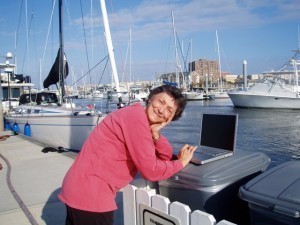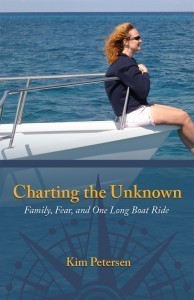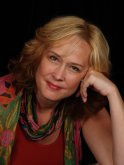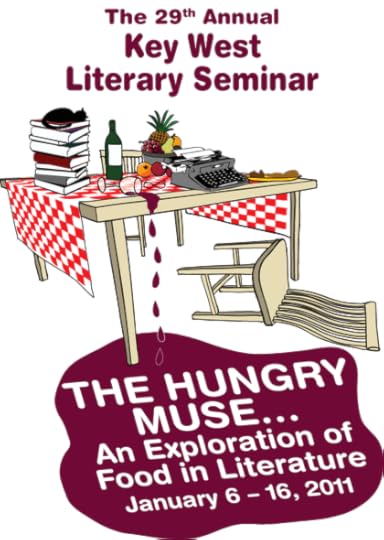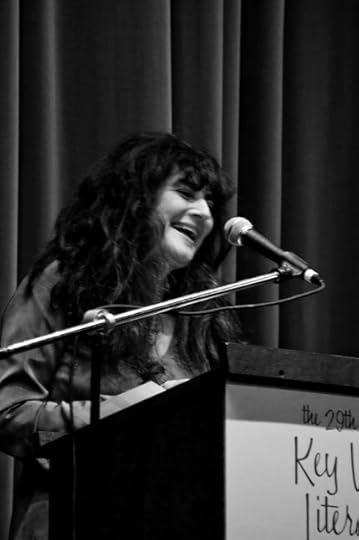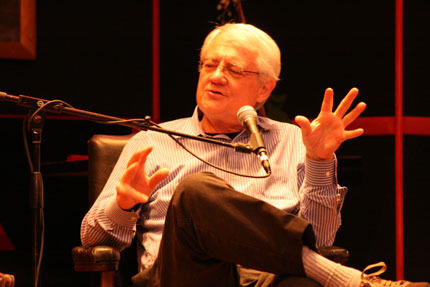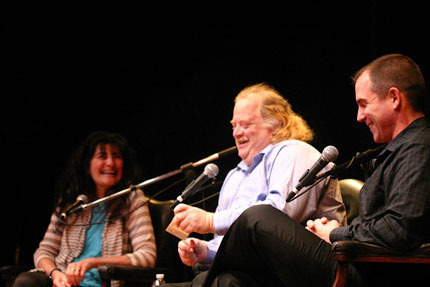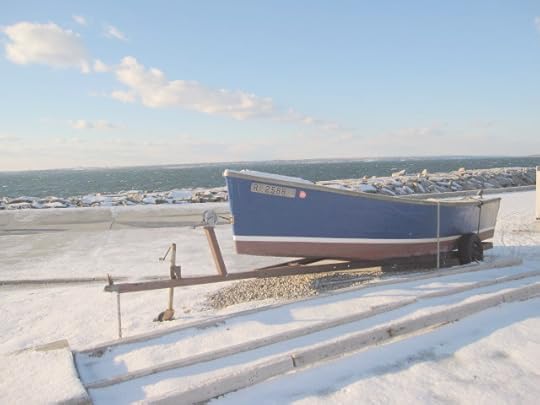Mike Jastrzebski's Blog, page 97
February 15, 2011
Free Range Institution
By Michael Haskins
Well, this is going to be short and sweet, or is it down and dirty? My new book, "Free Range Institution," will be released tomorrow and I am on the verge of a stress breakdown trying to put together a book signing. This Friday, Feb. 18, I will be in Delray Beach at the Murder on the Beach bookstore at 7 pm and I hope that if you are in the area, you'll stop by.
I am finding that the attitude of bookstores has changed since my 2008 book signing tour. In New York City the Mysterious Bookstore wanted insurances that I would bring in enough people to sell 30 books. I certainly hoped for that, but I couldn't guarantee it. So, instead of bookstores it looks like I will be the guest writer at a library or two in New Jersey, thanks to friends I have up there. The attitude of the independent bookstores seems to have changed from being about books and writers to one of business, profits, etc. In a world were they are going out of business regularly, it should be expected. The Mystery Bookstore in Los Angeles was located in Beverly Hills when I first went there. After I moved to Key West, the store sold and moved outside UCLA. I was to sign there in May, but it closed its doors the end of January, with only a few weeks of notice. This store had been in business for years, since the early '80s that I know of. I have a signing on April 23, at Murder by the Book in Houston and looks like I will be at the MWA table for the Los Angeles Times Book Festival on April 30 & May 1. I will also sign at the Flintridge Bookstore and Coffeehouse May 5, in the Burbank/Glendale area, and in Orange, Ca. at Book Carnival, but the date hasn't been set. Anne, the owner of the Book Carnival, emailed me and her most important question was about my books. She said her customers were readers that collected, so she was interested in only first editions. God help me, I wanted to kiss her. Sweeter words . . . I am a member of a vanishing breed that collects first editions.
I did it to have a fine collection to leave to my children one day, but now fear my grandchildren will not know what a book is. They will read, but it will be on Kindle or the computer. It maybe a challenge to get Goodwill to take my books after I've gone to meet Hemingway, Kerouac, Hammett, Ross Thomas, etc. I have another book in my series, "Car Wash Blues," coming out sometime in 2012, but fear this may be my last book signing tour because of the dwindling number of bookstores. This is a case where being proven wrong would be a blessing. It is an exciting time for me, but the news I get from some stores saddens me. Please shop your independent bookstores and if you are in the area of Delray Beach, Houston or any store I am signing at, come in. It could be our last chance to talk.
Share on Facebook
February 13, 2011
Counting down the weeks
It doesn't seem so long ago that I heralded the fact that Mary and I were going cruising in 2011 and that we were counting down the months. Well 2011 is here and we're still counting down, only now we've divided our countdown into weeks rather than months.
On Thursday of this week Mary is going to give her two weeks' notice at work. At that point there's no turning back. The steady paycheck will be no more. I'm not complaining, but it is a little scary. Now don't get me wrong. We've been planning for this day for fifteen years, ever since we bought our Islander 36 sailboat. We were married on the boat as we sailed up to the Mackinac Bridge and we knew then that this was what we wanted to do.
Going a little further on the counting down the weeks theme, it's only four weeks until I can apply for social security. Where did all those years go? It doesn't seem so long ago that I was going through my hippy phase and living in the woods of Maine where I built a log cabin. But that was 1976. Thirty-five years ago. That's a little scary to think about too.
We're giving ourselves 8 weeks to finish the work we need to do on the boat, then two weeks to pull her and do a bottom job. Last year we were talking twelve months, now we're talking twelve weeks. Of course we realize we have to build a little flexibility into our plans. Anyone who's ever worked on the boat, the adage, it takes twice as long and cost three times as much, is reality. So if it takes us fourteen or sixteen weeks before we're ready to leave, then we'll adjust.
Mary and I discovered the secret of getting away from the dock eight years ago when we first moved aboard Rough Draft. You need to cut the safety cords, no matter how scary it seems. It's what we did before we sailed away from Minnesota. It's what Hurricane Katrina forced us to do when we sailed away from Mobile, Alabama. And it's what we know we have to do to get away from Ft. Lauderdale.
Share on Facebook
February 10, 2011
Guest Marcia Talley on Sailing with Friends
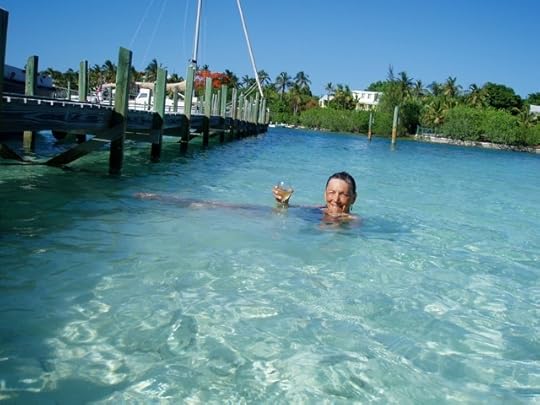
Marcia cooling off at Man O War Cay
I am so pleased today to welcome crime novelist Marcia Talley to Write on the Water. When I invited Marcia here, I asked her to share when and how she had started sailing. She wrote, "Barry and I bought our first sailboat, a 15 foot 'Redhead' that had all the sailing characteristics of a refrigerator, in 1966. We've been sailing ever since through a succession of old, reliable boats purchased used — a Columbia 24, a Tartan 30 and Troubadour, our reliable Tartan 37. This summer, we will start exploring New England waters in our first brand new sailboat, a Wauquiez Pilot Saloon 41 we've named Iolanthe. But don't tell Troubadour! She'll be happily floating at a mooring in Man O War, Abaco until we return in December."
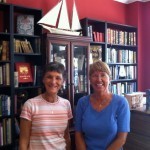 Last summer, when my friend Bruce and I sailed into Annapolis, we headed for the local book shop, and who should we meet there but Marcia. Whether in person or on the page, those of us who live on the water know that the world of boats is a small one indeed.
Last summer, when my friend Bruce and I sailed into Annapolis, we headed for the local book shop, and who should we meet there but Marcia. Whether in person or on the page, those of us who live on the water know that the world of boats is a small one indeed.
Sailing with Friends
Not too long ago, my husband retired. An avid sailor, his idea of a fab retirement trip was to pack up a few "necessities" in a duffle bag the size of a pillowcase, climb aboard our ancient Tartan 37 sailboat and set sail down the Intracoastal waterway from Annapolis to Fort Lauderdale — a distance of 1200 miles — and from there, another hundred miles or so across the Gulf Stream to the Bahamas.
I thought it'd be fun, too. Research, I smiled to myself, envisioning a novel — no! — a whole series of mystery novels, set along that scenic waterway. Assassins in Albemarle. Bodies in Beaufort. Corpses in Charleston. Deaths in Delray Beach. So, I packed up my laptop and went along.
After provisioning, there's barely enough room for two people on a sailboat — imagine living for six months in a space the size of your average bathroom. A radio, of course, but no TV. And no high speed internet, either, although wireless signals can pop up in the unlikeliest of places. I was sitting cross-legged on deck somewhere in the vicinity of Vero Beach one day, tapping out chapter three of the next Hannah Ives mystery when email suddenly started pinging into my mailbox. "Sail in circles!" I shouted to my husband. "This area's hot!"
The usual place to get free internet while cruising is an independent coffee shop, or the town's public library. It was at a public library in Myrtle Beach, NC, in fact, that I learned from my agent of a hardback deal (hurrah!) for an eleventh book in my mystery series. By Myrtle Beach, too, I'd read to the bottom of my modest, space-restricted TBR pile, so the mystery section of the library looked enormously inviting. I longed to dive right in, but, alas, what library is going to lend a book to someone who plans to sail into the sunset the following day? I was seriously reconsidering my decision not to buy a Kindle.
While doing a load of laundry in Charleston, South Carolina, I learned a life-saving fact. Marina laundromats are the lending libraries of the cruising sailor. Here's the deal: you take one, you leave one. At Charleston City Marina, I left Margaret Maron's Rituals of the Season on a shelf over the coin-operated dryer and picked up R is for Ricochet, which I'd somehow missed when it first came out in 2004. I left Sue Grafton in Isle of Hope, Georgia where I snagged a copy of Rochelle Krich's Blues in the Night which kept me happily engrossed all the way to my next laundry day in Fernandina Beach, Florida. There, Rochelle was traded for a well-thumbed copy of Dead Before Dark by Charlaine Harris. When Elaine Viets wrote High Heels are Murder, I doubt she imagined anyone would be plucking it off a rickety bookshelf on a tropical island in the Bahamas but I did, in Hope Town in the Abacos, leaving Ellen Crosby's Merlot Murders in its place. And at the marina on nearby Man of War Cay, I picked up a plumply waterlogged copy of Carolyn Hart's (appropriately titled!) Set Sail for Murder (in hardback!) thinking, "Today's my lucky day!"
Then I really got lucky. One morning while listening to the Abaco Cruisers' Net, I heard about Buck a Book. Open Monday-Wednesday-Friday from 10 to 1 and staffed by Mimi Rehor and a string of volunteers, Buck a Book turned out to be a battered, turquoise shipping container plunked down under a palm tree in a muddy parking lot opposite The Conch Inn in Marsh Harbour, capital of the Abacos. Mimi accepts book donations and sells them to sailors like me for a buck each, all to benefit the gravely endangered wild horses of Abaco. (http://www.arkwild.org — there are only five horses left! – give early and often!) Inside the cramped, dimly-lit space, with a computer screen glowing bluely in one corner and a dissenting fan keeping the stagnant air gently moving from another, I checked out the shelves: Steven King, James Patterson, Michael Critchton, Patricia Cornwell, Nora Roberts and the usual suspects were there, for sure, but I'm happy to report that books written by authors I actually KNOW were more than generously represented on Mimi's shelves. I greedily stocked up on Denise Swanson, Christopher Fowler, Nancy Martin, Jerrilyn Farmer, Chassie West, Donna Andrews (how on earth had I missed Click Here for Murder?), Andrew Taylor and half a dozen more, paying for them with a twenty dollar bill, and please keep the change, Mimi.
I'll be going home to Maryland in another month to catch up on paperwork (taxes!) and get reacquainted with my cat, Tommy, who will probably spend three days sulking under the bed, just to punish me. Then it's back to the islands again. But, no matter how long I'm away from home, thanks to my fellow cruisers, I never really feel out of touch with my friends.
***
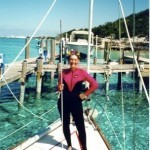 Marcia Talley is the Agatha and Anthony-award winning author of All Things Undying and eight previous Hannah Ives mysteries. The tenth book in the series, A Quiet Death, will be released in May. Her short stories appear in more than a dozen collections. She is immediate past president of Sisters in Crime, and a Member of Mystery Writers of America and The Authors' Guild.
Marcia Talley is the Agatha and Anthony-award winning author of All Things Undying and eight previous Hannah Ives mysteries. The tenth book in the series, A Quiet Death, will be released in May. Her short stories appear in more than a dozen collections. She is immediate past president of Sisters in Crime, and a Member of Mystery Writers of America and The Authors' Guild.
Share on Facebook
Introducing Kim Petersen-A Writer on the Water
Introducing Kim Petersen-A Writer on the Water
I met Kim Petersen, the author of Charting the Unknown: Family, Fear and One Long Boat Ride at the Florida Writers Conference where she was accepting the Royal Palm Literary Award for memoir. She is a writer on the water.
Kim Petersen had big dreams, but losing a daughter to SIDS rattled her faith and instilled fear of the unknown. In her mid-thirties, feeling lost amidst errands and meetings, Kim rediscovers a college bucket-list of dreams that inspires her to confront that fear. Longing to reconnect with herself and her family, she and her husband sell everything and embark on the journey of a lifetime-to build a boat and cross the Atlantic Ocean.
With no nautical experience, they acclimate to living onboard in tight quarters, homeschooling teenagers, seasickness and boat handling, while the dream of crossing the ocean remains strong. Kim begins to believe an alternate reality-that she could be brave-and faces her ultimate fear: 4,000 miles of open water. Underway, Kim discovers that navigating the unchartered water of her soul offers its own adventure.
Charting the Unknown is as much an inward journey into becoming a tight-knit family as it is an outward adventure. It is a thorough account of learning how to become a live-aboard.
As I read the well-written account of Kim's journey, I laughed out loud at calling her family the crew and cried openly at the heartbreak of losing a child. This book is an emotional adventure. I also connected with the role Kim plays of wife of the captain and scribe of the events. I wanted to know more about how she came to write the book.
1. The moto of WriteOnTheWater is So You Want to Quit Your Job, Move onto a Boat, and Write. It seems like you did that. What prompted the initial desire to move onto the water? Did you always love boating?
KIM- Twenty years ago, sitting in the university cafeteria, my husband and I wrote up a bucket list of dreams and number six on that list was "live on a boat and cross and ocean." I remember that the idea appealed to us although neither of us had any boating experience. More than anything, I think the notion of breaking free, living simply and exploring the world captured our imaginations. As often happens in life, we had kids, got busy with jobs and it wasn't until fifteen years later that I happened to be cleaning the basement and found that old bucket-list. We were crazy-busy at the time and longing for a change in our lives. Finding that list reawakened something in both of us, a desire to reconnect with ourselves and our family. "Live on a boat" was a way to accomplish this. Our kids were teenagers at the time and we wanted to instill some good values, the importance of family, thinking outside the box and exploration before they left home. To be honest, because of a previous tragedy, I was quite afraid of the water and had been living in bondage to fear for many years. The desire to change my perspective, to confront that fear, motivated me to live on a boat. .
2. You talk a lot about living unconventionally, which most of us on boats do. What struck you as the biggest adjustment you have to make?
KIM- We found our 65-foot power catamaran in a farmer's field in New Zealand. The hull, designed by Malcolm Tennant, was new construction but there was nothing on the inside, no plumbing, electrical, or woodworking. We shipped the shell to Florida, sold everything, quit our jobs and moved from Toronto, Canada to finish her. In addition to having no boating experience, save for some canoeing and a week on a Carnival Cruise Ship we had no boat-building experience, either. After moving aboard, the four of us not only had to complete the construction, but learn to live together in small quarters and this was perhaps the hardest thing. I remember after a particularly difficult day building boat cabinets, our son Stefan, who was 11 when we moved aboard, said to me, "Mom, you know when you and dad said living on a boat would be a grand adventure? Well, this isn't the adventure I signed up for!" One thing we learned in those early days: living unconventionally involves risk and hard work. The payoff (making it all worthwhile) came when living aboard had become the "norm," and we began to enjoy the outdoors, each other, a simpler existence and working as a team.
3.There has been a lot of talk on WOW about balancing the work needed to be done, exploring new ports, and writing. You had to do this while homeschooling two teenagers. Did you strike a balance? Was one more time consuming that the other? When did you find time to write?
KIM- It took a bit of time to find that balance, to get into a routine, but after that things ticked along beautifully. We fell into the pattern of working hard in the mornings, the kids doing their school work, I was writing and Mike continued to run a business over the internet. I'm a morning person, so I would wake-up early, often around 5am. Doing this, I was able to get a few hours of uninterrupted writing time in before the kids woke up around eight o'clock. Like any full-time writer, being disciplined was something I wrestled with. It didn't take me long to realize that my best work was done when I was committed to the craft, so I kept a fairly regimented morning writing schedule. The four of us would work until 1PM or so, have lunch, then spend the rest of the day exploring, going to museums, or visiting historic sites.
The wonderful thing about homeschooling teenagers is that they are at a point in their education when they can take responsibility for their own learning. Both our kids were enrolled in a correspondence high school (Keystone National High School) that kept track of their records. Working independently, Lauren and Stefan did their work online and sent it in over the internet. They were even able to join some clubs like the school newspaper and the yearbook. When Mike or I couldn't answer their questions, they could email their teacher. As parents, we simply acted as scholastic mentors. It was wonderful practice for university.
4. You write that "Over the course of years, my childhood love of adventure had largely been tamed." Did setting sail ignite your sense of adventure?
KIM- It absolutely did. I think anytime you put yourself in a position where what you are experiencing is new, is foreign, that constitutes adventure. Everything about living aboard was a fresh encounter. Whether it was manatees swimming by or the feeling of the boat as it bobbed fifteen miles offshore; anchoring among uninhabited islands in the Bahamas or being 900 miles from the nearest land, as we were while crossing the Atlantic Ocean, it was all new for us.
The Mediterranean in particular was an adventure because so much of what we were experiencing was outside the realm of our experience. While in Morocco, we rode camels into the Sahara Desert to spend a few days in a Bedouin camp. One night as we sat around the campfire, a middle-aged Bedouin man we had befriended suddenly looked at Mike with enlightenment, saying, "OH! I understand now! You travel with your family across the great ocean. You are nomad. I travel with my family across the great desert. I am a nomad!" Then he reached over to grab Mikes arm, looked warmly into his eyes before saying, "You are my nomad brother!" And this is the best thing about adventure: it is not about the experience itself, but the way it changes you that makes it valuable. This, in turn, affects the way you respond to the world.
5. It seems that you really explored the food in many places Chysalis voyaged. Do you have a favorite culinary destination? Favorite cruising ground?
KIM- Food was a motivating factor in my agreement to cross the ocean. Whenever I had visions of dark clouds and twenty foot waves coming over the bow, I would therapeutically envision plates of fettuccini alfredo, nocciola gelato, paella, hummus and lamb kabob and my strength would return. We anticipated good food in Italy and it certainly didn't disappoint us. But the best culinary collisions were the ones that happened in unexpected, often out-of-the-way places.
For instance: on our way from Gibraltar to Barcelona, we had been forced to seek shelter from a storm in the small Spanish fishing village of Calpe where no one spoke a lick of English. That night, we walked to a local restaurant and tried to interpret the menu, all in Spanish. When we asked him about it, our server simply shrugged his shoulders. So, much to the amusement of the restaurant staff, we put the menus on the table, closed our eyes and each pointed to something. When my plate arrived, it supported the largest purple octopus tentacle I had ever seen, probably 3 inches in diameter and 10-12 inches long, the tip draped over the plate. It was well salted and sitting in a puddle of pale green olive oil. When I raised my eyebrows at our server, he nodded, went away and came back with a large pepper grinder with which he generously peppered my tentacle. Never mind that I had been hoping for a cup of garlic aioli. Once I got past the look of it (the suction cups were large), I found it delicious. I dipped small, tender chunks in the fruitiest olive oil I've ever tasted, the rock salt and pepper clinging to the morsel as if applied with glue. The simplicity of the whole dish was brilliant.
I love this quote by Henry Miller because it sums up not only my culinary experiences underway, but how I have come to look at the world with its amazing inhabitants, geography and history: "Develop interest in life as you see it; in people, things, literature, music—the world is simply throbbing with rich treasures, beautiful souls and interesting people. Forget yourself."
* * *
This is a book, not only for those of us already on the water, but those on the shore who will recognize the familiar fears and learning curve Kim went through. It is a book for all of us who want to quit our jobs, move onto a boat and write.
Kim continues to live aboard Chrysalis and is still writing on the water. She is currently working on her second book about her pilgrimage through the Mediterranean. You can read more about her at her web-site www.chartingtheunknown.com.
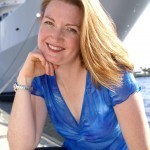 Victoria Allman, author SEAsoned: A Chef's Journey with Her Captain, has been following her stomach around the globe for twelve years as a yacht chef. She writes about her floating culinary odyssey through Europe, the Caribbean, Nepal, Vietnam, Africa and the South Pacific in her first book, Sea Fare: A Chef's Journey Across the Ocean.
Victoria Allman, author SEAsoned: A Chef's Journey with Her Captain, has been following her stomach around the globe for twelve years as a yacht chef. She writes about her floating culinary odyssey through Europe, the Caribbean, Nepal, Vietnam, Africa and the South Pacific in her first book, Sea Fare: A Chef's Journey Across the Ocean.
You can read more of her food-driven escapades through her web-site, www.victoriaallman.com
Share on Facebook
February 9, 2011
Navigational aids for writers…
[image error]
I've always been a single-hander, even when others are aboard. 'Tiller-hog' might be a more accurate description, which is why, I suppose, my daughter was always my favorite crew aboard my old catboat. She was perfectly content to nap down below or lounge around the cockpit reading while I tended the helm. My choice of boat, the little gaff-rigged cat with her single graceful sail was ideal, responding as I peaked of the gaff, adjusted the centerboard and the heading. She was the perfect boat for daysailing up and down along the Hudson River. But if I ever wanted to cruise further, I was limiting myself and I knew it.
My approach to writing over the years had been much the same. I'd been going it single-handed. Writing itself is a solitary practice, alone with one's thoughts, avoiding all distractions of friends and conversation. It's a wonderful excuse… "I'm writing, don't bother me." It lets us build a wall around ourselves and block all else out. I've never understood how some writers can work in public places, surrounded by activity; I get my best work done when my only company is a sleeping dog. Yes, for drafts and revisions I enlist some trusted non-writer friends, the ones I know will give me their most brutally honest opinions and for them I am eternally grateful. But beyond that?
I've come to realize that while one can be solitary, can write alone, even publish independently, once a book reaches the market, we as writers enter a community. So long as people are reading our books, we are now a topic for discussion and as writers we should embrace that. For years I'd avoided social networks such as Facebook and Twitter, certain that they were merely distractions and time-wasters. That was a mistake on my part; I see now they are a way of connecting with my readers as well as fellow writers. These networks offer the ability to share work, discover the works of others, and to hear immediate and uncensored feedback. When I discover a reader tweeting to their friends about how much they enjoyed my book, it makes my day. In taking a moment to thank that tweeter, I've connected with a fan on a personal level that is more meaningful to us both. Five stars on Goodreads is great, but when you find yourself in an actual real-time conversation with a fan about a particular character, setting or scene, it gives you a greater perspective on your work. It's also opened my eyes to how valuable sharing my thoughts about others writers' books can be to them, so I'm making a point of speaking out about the ones I enjoy. The internet affords us the opportunities to interact with fans on a level that never existed before, one we as writers should embrace.
We can sail into unfamiliar waters but we'll do far better if we check the charts first, utilize our instruments and talk to those who've sailed there before us. The internet provides an abundance of navigational aids for writers; understanding how they can help us makes for a more enjoyable voyage.
Share on Facebook
February 7, 2011
Rough Draft, Rough Water
by Tom Tripp
Excerpt from work-in-progress…
———-
The first of the really big waves surprised Mike Callahan and it was too late to adjust the boat's heading for least impact. He braced himself stiffly at the helm, hands firm on the teak wheel while the wild, green water came over the foredeck and slammed into the pilothouse windows in front of him. The wind was howling down the long stretches of the Georgia Strait ahead of him; quickly building six- and eight-foot waves and pushing them closer and closer together so that now they hammered his boat incessantly, leaving barely enough time to steady his footing between each blow.
Knowing it wouldn't help much, he switched on the searchlight that was mounted on the flybridge deck above him and aimed it at the water surging over the bow. Peering through the late afternoon gloom and wind-whipped spray, he could see the seaweed and other bits of flotsam inside the green cascades as they fell into the shaft of the powerful spotlight. Callahan shuddered as he thought about the possibility of being hit by a dead-head – a semi-submerged, waterlogged tree trunk – in these roiling seas. They were all too-common in the waters of Puget Sound and the San Juan Islands; the detritus of a logging industry that used the Sound as water-borne conveyor for lumber cut in northern mountains. It was bad enough to run into one at slow speed in calm seas, but under these conditions, the result could be catastrophic.
Another outsized wave came over the bow, the searchlight illuminating the severed crest of it as it rushed back to the pilothouse windows, exploding there with a brilliant emerald violence.
"Okay, that's enough," thought Callahan. The prospect of several hours more of wave-pounding misery was sufficient to convince even the hardiest mariner to give up the destination and seek shelter.
Callahan briefly took his eyes off the water ahead and looked down at the electronic chartplotter, whose glowing screen revealed the location of his boat south of the U.S. – Canadian border north of Puget Sound. The main mass of Orcas Island was several miles off to the east and there was a scattered group of small islands closer, to the northeast. He had been heading north from his home port near Port Townsend for nearly five hours and had hoped to get as far north as Semiahmoo, near the Canadian border, but with the storm now building down on him from the same direction he was headed, that seemed unlikely now. To make matters worse, sunset was only a few minutes away, and although in this storm the term "daylight" was something of an exaggeration, Callahan knew that in another hour, with no moon or stars, "the black of night" would qualify as serious understatement. He also knew from long years on the water that knowing when to call it quits was often the only thing that distinguished the successful boat captains from the cemetery residents.
———-
The preceding is the introduction to a main character of my novel, "The Fourth Wave," which is almost ready to either hit the road in search of an agent, or dive into Kindleworld. Needless to say (to this audience), the detour to a small island and sheltered anchorage our character is being forced to make due to the storm will set him on a much darker and unexpected path. Like many of us, when I write about Callahan's time at the helm, I am taking directly from my own memories of green water and wild motion.
This work Copyright © 2011 by Thomas M. Tripp. All rights reserved.
Share on Facebook
February 6, 2011
From Rags to Riches on the Kindle: Monthly sales and earnings breakdown from June 2010-January 2011.
By Mike Jastrzebski
It has been a little over seven months since I began my journey to self-publication on the Kindle. When I decided to self-publish my books as e-books I figured that if I could sell 10 books a week I'd make around $1000.00 a year (my e-books sell at $2.99 each). It's not much but Mary is retiring next month and I will begin collecting my social security in June. We are going to fulfill our dream of going cruising on our sailboat and I figured an extra thousand a year would be a nice little supplement to what we will have coming in.
My first book, The Storm Killer, went live on June 27th, 2010. I sold 2 copies in those final days of June and it looked like my initial estimates might be right on. Then July came and a funny thing happened, I sold 94 books and made $185.15. I thought, hey, if I could do that every month it would be like having a small pension to supplement our retirement. I was starting to get excited about the whole e-book thing.
I wasn't quite sure what to expect in August because I was adding a second book to the mix. On August 10th, Key Lime Blues (A Wes Darling Mystery)
10th, Key Lime Blues (A Wes Darling Mystery) went live. In August I sold 381 copies of The Storm Killer
went live. In August I sold 381 copies of The Storm Killer and 166 copies of Key Lime Blues (A Wes Darling Mystery)
and 166 copies of Key Lime Blues (A Wes Darling Mystery) and earned $1059.57. Now I figured if I could keep doing this it would be a real boost to our retirement–but it wasn't quite that easy. Here's a breakdown of my sales and earnings for the last five months. For the sake of convenience I will refer to The Storm Killer as SK and Key Lime Blues as KLB.
and earned $1059.57. Now I figured if I could keep doing this it would be a real boost to our retirement–but it wasn't quite that easy. Here's a breakdown of my sales and earnings for the last five months. For the sake of convenience I will refer to The Storm Killer as SK and Key Lime Blues as KLB.
September sales- SK sold 263 copies and KLB sold 199 copies, (462 total) and earned $826.72.
October sales- SK sold 336 copies and KLB sold 152 copies, (488 total) and earned $933.23.
November sales- SK sold 179 copies and KLB sold 152 copies, (293 total) and earned $561.05.
Decenber sales- SK sold 168 copies and KLB sold 203 copies, (371 total) and earned $721.70.
January sales- SK sold 329 copies and KLB sold 449 copies, (778 total) and earned $1540.31.
Over this time period I also sold 10 e-books on Smashwords, 8 on the Barnes and Noble site, plus 3 copies of KLB and 2 copies of SK in paperback. That's right. In January I made both books available as trade paperbacks and they can be ordered at Amazon for $12.95. Here are the links: Order The Storm Killer in paperback or Order Key Lime Blues in paperback.
or Order Key Lime Blues in paperback.
If you're curious I've sold 70 copies of SK and 118 copies of KLB already in February plus 2 SK and 1 KLB in paperback. So if you're wondering if self-publishing on the Kindle works, I'm here to tell you it does, and not just for me. There are dozens of authors out there who are selling five or ten times as many books as I'm selling right now.
Keep in mind that prior to self-publishing on the Kindle I had never published a book. In fact, if you had Googled my name back in March of 2010 before I started the blog http://www.writeonthewater.com, you would not have found me. So if you're unpublished and have a good, well-edited book you want to publish, or a published author thinking of putting up your backlist, I'm here to tell you that there's gold in them there hills.
So if you're thinking of e-publishing, what's really holding you back? I'd like to hear your reasons for waiting.
Share on Facebook
February 3, 2011
We need to change the definition of "rich"
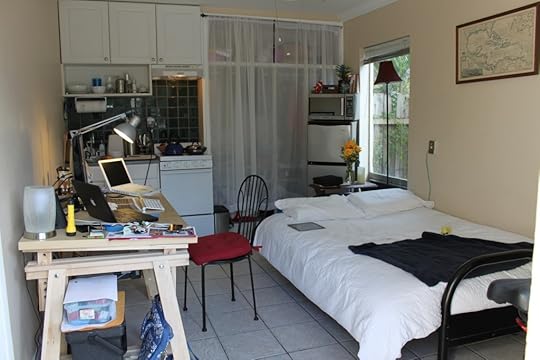
The simple small space I call home
I went to a party Saturday night with other folks from my work. One person I'd never met before asked me how long I had been working for the College. I explained that I had started as an adjunct in 1999, and it was only three years ago that I got the full-time position. She smiled and said that I was so lucky to have joined the rarified ranks of full-timers, and that after this year, I would then have tenure and wasn't that terrific? Tenure means you will have that same job for the rest of your working life. I know I am supposed to think that sounds wonderful. To me, it scares me. In fact, it has scared me so much, I told her, that I had just turned in my letter announcing my early retirement.
"Oh, you must be rich. Quitting your job and taking off to go sailing? Even after thirty years, I could never afford to do that."
Rich, me? I have to laugh. And I am laughing because yes, I do feel rich these days — but it is not because of an abundance of money.
I feel rich when I take off on my bike to do the bike/bus thing to work. I love riding along the riverfront saying good morning to the joggers and dog walkers, smelling the coffee brewing in the homes I pass.
I feel rich when I sit on the warm brick in my little courtyard and stroke the head of my old dog as he sleeps in the sun.
I feel rich when I'm sitting in the cockpit of my friend Bruce's boat and we hear the soft exhale of a manatee surfacing just under the transom.
I feel rich when I take the time to sit and listen to a friend tell me about her father who is dying.
I feel rich when I share a meal with my son and I see the excitement in his eyes as he spins his dreams for the future.
When I wake up in my boat's forepeak berth and listen to the mockingbirds' songs or the rumble of an early boat making its way down river, I feel so much lighter and happier and yes, richer, than I could ever feel awaking in a heavily mortgaged 5-bedroom home. The very idea makes me shudder. And now that the seasonal liveaboard slip rent is too high in my Lauderdale marina, and I've moved into this little efficiency apartment to save for my cruising kitty, I'm having a blast exploring my new neighborhood on foot and by bike.
Wealth is a relative concept. If your income is over six figures and your spending is that or more, then you are broke, regardless of your high salary. But in our crazy consumer society, that form of broke has become the model of success, and people who don't aspire to spend voraciously are sometimes seen as morally inferior. In the past few weeks, I've had lots of people from hair stylists to veterinarians go out of their way to let me know they think I'm cheap because I haven't ordered up every single option on the menu. Choosing simplicity sometimes means choosing a lonesome path. But it feels right for me, right for the planet.
Lest I give the wrong impression here, I am intimately aware that sailboats are very expensive — both to buy and to maintain. And there are plenty of those six-figure earners out there cruising on six-figure boats, eating out at restaurants, staying in marinas, and generally spending in a week what I expect to live on for a month or more. The best way to keep maintenance expenses down on a boat, however, is to simplify. The bigger the boat and the more systems you have on board, the more there is that can break and the more likely it is that you will be spending money. While I like to dream of a bigger boat with a nice office/writing space, in reality, my 33-foot 1989 Caliber is just the right size and vintage boat for my budget. I don't have as much comfort or room, but because I don't have a generator, fancy electronics, marine air conditioning, etc., I don't have to spend as much time maintaining the boat, either.
The fact is, we have a finite amount of time on this earth and the older I get the more that fact becomes achingly apparent. Literally. And it takes up so much of that time to make the money that the average American thinks is necessary to live a middle class lifestyle. I have made a conscious decision to enjoy my life more by being willing to spend and consume less. In other words, I am "rich" because I am willing to be "poor."
Fair winds,
Christine
Share on Facebook
Stage Fright
I have just come back from ten days at the Key West Literary Seminar. It was an intense experience of being submerged in writing. This year's theme was The Hungry Muse: An Exploration of Food in Literature. It was like the seminar was designed just or me. I was excited to hear authors who I had read for years speak. I had my favorites to listen to. I was attending partly as an author but more so as a fan.
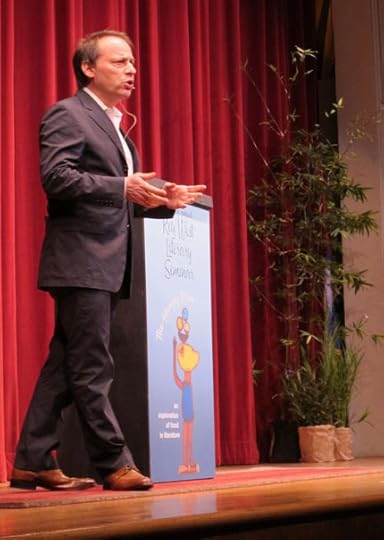 (All photos courtesy of The Key West Literary Seminar and photographers: Ian Rowan, Nick Vagnoni, Michael Blades, and Meghan Capozzi)
(All photos courtesy of The Key West Literary Seminar and photographers: Ian Rowan, Nick Vagnoni, Michael Blades, and Meghan Capozzi)
There were big names there: Ruth Reichl from Gourmet Magazine, David Gopnik from The New Yorker, Frank Bruni from The New York Times and Madhur Jaffrey, the actress and asian food authority. But, there were also new names to me, authors I had not read before.
The first session was sold out and as we all filed into the majestic San Carlos Institute I couldn't help feeling awestruck.
But then, something strange happened. Over the first weekend, as the presenters spoke, my loyalties began shifting. It wasn't that my well-written favorites didn't have anything interesting to say; it was that they were flat on stage. Others came to life.
Molly O'Neill had me laughing out loud and Diana Abu Jaber sent me straight to the bookstore to buy her books. They were inspiring on stage and represented their work brilliantly.
It was a fabulous seminar of discovery and information. But, it scared me.
SEAsoned, my second book about being a yacht chef has just come out. I have a publicist who is working hard at getting the book into as many hands as possible. One of the marketing gigs she is setting up is book signings. I will be standing up in front of a group of people and talking about my book.
Gulp!
What if I am one of those flat presenters? I already get nervous and stumble when reading my work in my critique group…and they are my friends. I don't want to get up and just read, I find that boring. But what to talk about? And how do I sound engaging and inspiring?
I decided I better do some research on speaking in front of a crowd. Here are the tips I found:
1. Preparation is key – Know what you will speak about and thoroughly explore what you want to say. Knowing what you want to talk about is better than a rehearsed speech that can sound stilted or worse fumbly if you forget your next line.
2. Don't force jokes – If humor does not come naturally, do not attempt it. Speak in your natural cadence and pattern. Be yourself!
3. Think positive thoughts – I can do this! I can do this! Condition yourself to think encouraging thoughts and you will not seem nervous.
4. Connect with your audience – Speak with feeling and emphasize points that you feel passionate about to include the audience in your talk. Emphasizing key ideas will make people sit up and listen closer. Adding emotion to your talk draws people in. Make eye contact with as many people as possible.
5. Look your best – As un-politically correct as it is, people respond better to well groomed people. Plus, you will feel better and more confident.
6. Talk slowly and clearly – Take a deep breath and talk with the audience instead of racing through your words. Fast-talking may get you out of the spotlight quicker but is painful and detrimental to your promotion.
7. Find a friend in the crowd – Speaking to one person about something you believe in is much easier. Pick someone and have a conversation with them (one-sided of course) It will make your talk sound so much more natural.
8. Greet the audience – Shaking hands as people arrive and speaking to everyone beforehand makes you feel like these are your friends. Contact with individuals puts you at ease. Remember all the people are there because they want to be. They want to support you.
9. Relax – Smiling and relaxing will automatically make you more engaging in front of an audience.
10. Have fun – Enjoy this time. If you have fun with your talk then the audience will too!
The funny thing is, that when I teach cooking classes or talk about food I am completely confident. I can talk for hours and be engaging. But, when it comes time to talk about my books, I get nervous and tongue-tied.
Does this happen to you? Do you have any tricks to ease the embarrassment of talking about your work?
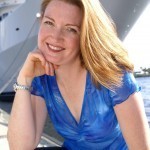 Victoria Allman, author SEAsoned: A Chef's Journey with Her Captain, has been following her stomach around the globe for twelve years as a yacht chef. She writes about her floating culinary odyssey through Europe, the Caribbean, Nepal, Vietnam, Africa and the South Pacific in her first book, Sea Fare: A Chef's Journey Across the Ocean.
Victoria Allman, author SEAsoned: A Chef's Journey with Her Captain, has been following her stomach around the globe for twelve years as a yacht chef. She writes about her floating culinary odyssey through Europe, the Caribbean, Nepal, Vietnam, Africa and the South Pacific in her first book, Sea Fare: A Chef's Journey Across the Ocean.
Victoria is a columnist for Dockwalk, an International magazine for crew members aboard yachts. Her column, Dishing It Up, is a humorous look at cooking for the rich and famous in an ever-moving galley.
She also regularly contributes tales of her tasty adventures to Marina Life Magazine and OceanLines.
You can read more of her food-driven escapades through her web-site, www.victoriaallman.com
Share on Facebook
February 1, 2011
A Moment in the Journey
This past weekend, Sally and I were off to dinner at a friend's house when I received a call from Mike.
I figured he was calling to remind me that snowfall accumulation in Fort Lauderdale is running five feet or so less than in Boston. Instead, I heard, "John, did you know that your book made it onto Amazon's Top-100 for Hardboiled Mysteries."
If driving and talking on your cell qualifies as distracted driving, I now slid into delirious driving. "Mike, are you sure?"
"Looking at it right now. A Single Deadly Truth is ranked 49."
Immediately, my mind began to spin in a search for explanations. Several emerged. Maybe someone bought my book online and a dictionary fell from their shelf, landing on the keyboard, triggering an ongoing sequence of erroneous orders? I believe that was my first thought, quickly followed by a recollection that I sent an e-mail mention of the book to the staff at Radio Margaritaville. Was it possible that one of those Satellite radio DJ's mentioned the book on the air? Improbable, but no less so than the fact that my sales mysteriously jumped.
"Thanks for letting me know, Mike. I'll check it out when I get home later tonight."
An enjoyable dinner allowed these thoughts to hide away for several hours, but when we drove home around midnight I went to the computer and pulled up the Amazon site for my own look. Sure enough, there I was. Now I was at 45. One behind Robert B. Parker, one ahead of Michael Connelly.
I knew, of course, that the moment would not last. I also knew that those two best selling authors have a whole slew of books up there and they'll sell day after day after day. And when they come out with a new book they shoot to the very top of major bestsellers lists (that's even the case with Parker's recent books that followed his death last year). Still. There it was, my book sandwiched between the works of two of my favorite authors.
"Sally, come here and check this out!"
Out of the warm confines of her sleep came my wife. She leaned over. Focused. Leaned in closer. "Oh, that was worth getting up for."
I had figured it out by then. My book appeared on a Kindle newsletter that day. Twenty-four hours in the world of Internet blogspheres and my sales spiked.
I told my wife, "The sales will slow and I'll drop off the list by tomorrow morning." I was pretty close with that – I stayed on the list until Monday morning.
I have some Internet promotions planned and it's my hope that I get back up on that list. Maybe I'll even have a run like Mike is experiencing and find myself staying up there. Regardless of what happens, I'll always remember the mixture of contentment and joy I had sitting at my computer looking at the cover of A Single Deadly Truth wedged between two of my favorite writers. To the readers who brought me such joy – thank you many times over.
Share on Facebook

